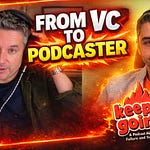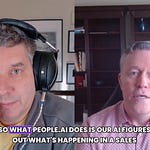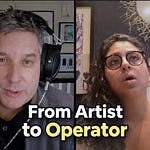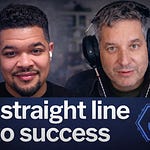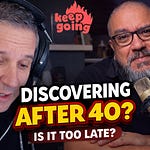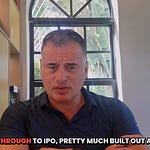I recorded this episode in an old hoodie, unshaven, feeling more “survival mode” than “thriving.” Which is exactly why I wanted to talk to Jon Rosemberg.
Jon is the co-founder of Anther and the CEO of Strongpoint Group. He also has a background in positive psychology and a new book coming out, A Guide to Thriving, from Wiley on November 25. On paper he is the kind of person my inner cynic wants to roll its eyes at. In reality, he is someone who has thought very hard about how to keep going when the world feels like it is sliding sideways.
We started with a simple point. If you and I were living a hundred years ago, there is a good chance we would already be dead. No antibiotics. No clean water on demand. No modern surgery. No cheap food from the supermarket. By almost every hard metric, life expectancy, infant mortality, access to education, we are in a far better spot than our grandparents.
Jon calls this a kind of golden age. I pushed back with a Matrix joke, because of course I did. But he is not naive about it. His argument is that we confuse the state of the world with the state of our feeds. We stare at screens that are tuned to keep us twitchy and outraged, and we start to believe that this is the full story.
He gave a small, sharp example. If you buy all your clothes on Amazon and Amazon only shows you three types of shirts, you live in a world of three shirts. You feel like you are choosing, but someone else quietly narrowed the menu. That is what he means by a loss of agency. We are letting algorithms make the first cut on our options, then telling ourselves we are free.
Agency is the core of his book. Not in the motivational poster sense. In a very specific way. Agency, the way he defines it, is the capacity to make an intentional choice, backed by a real belief that the choice matters, that it will have an effect on your life and the people around you.
I asked him the question that keeps coming up on this show. What about the project manager who gets replaced by an AI agent. What about the media worker whose “email job” is now a prompt in a chatbot. Do you tell that person to open a bakery, move to the country, become a monk.
He refused the easy answer. Instead he walked through a simple framework he uses, AIR, which stands for awareness, inquiry, and reframe.
Awareness is the first step. When you get fired, the only thing you can see is the disaster in front of you. He used a Rubik’s Cube as a prop during our talk. When it is right up against your eye, all you see is one little red square. Awareness is the act of moving it away just enough to see that there is a whole cube there. More colors. More faces. More moves than you first thought.
Inquiry is the second step. That is where you start to turn the cube. You test ideas. You ask what skills you really have, who is in your network, what resources you can use. You look for more than one path out of the mess. Not fantasies. Actual options.
Reframe is the third step. It is not magic. It does not make the pain go away. It is the moment where you admit that your story is not “my life is over because I lost this job.” It becomes something closer to “this is a hard change, and here are three real things I can try next.” That shift sounds small on the page. In practice it is the difference between being frozen and taking a step.
This is where AI enters the conversation in a serious way. We are in a very strange time. You can feel the temptation inside big companies. Fire the person making two hundred and fifty grand. Hire a vendor. Drop in an AI system. Call it innovation. Cash the savings.
Jon does not pretend to have a script for the next five years. He compared AI to fire. It will be used for good things and for stupid, cruel things. But he pointed to one solid data point. Companies that treat employee well-being as a real priority tend to outperform the ones that do not. Markets are not kind, yet even in that cold space, looking after people seems to pay off.
None of that solves the feeling a lot of us have right now. We are living longer. We have more calories, more streaming shows, more everything. And at the same time, depression and anxiety are everywhere. The basic needs are met, and yet we feel like we are coming apart.
His answer there is not new, but it is backed by a lot of research. Social connection shifts almost every health outcome we care about. Live longer. Less heart disease. Lower risk of stroke. Better immune response. Lower odds of dementia. You could describe it as the closest thing we have to a real life “miracle drug” that is free.
So what do you do with that if you are stuck in a small apartment in a big city, working a job you are scared to lose, scrolling yourself numb at night. You do not fix it in one sweep. You do not suddenly find a tribe by Tuesday. You start with one intentional move toward another human. A regular coffee with one friend. A club. A class. A weekly call with someone who is not part of your household. It sounds tiny. It is not.
We also talked about small towns, where you see the same faces every day and still feel alone because everyone is on their phones. He kept returning to the same word. Choice. Not in a “you can do anything if you try” way. In a quieter way. You can choose to put the phone down for an hour and talk to someone. You can choose to ask for help. You can choose to listen.
He brought up Viktor Frankl, who wrote Man’s Search for Meaning after surviving the camps. Frankl’s claim was stark. Even in terrible conditions, there was still one last human freedom, the ability to choose how to respond inwardly. Jon is careful here. Some people really do not have options, because of health, war, or poverty. But many of us have more room than we think, and we convince ourselves we have none.
That is really the heart of this episode for me. Keep Going is a podcast about success and failure, but it is really about this thin strip between the two, the place where you decide to take one more step or not. Jon’s work is about widening that strip. Creating a bit more space between “everything is ruined” and “I have at least one move.”
If you want to go deeper into his ideas, his book is called A Guide to Thriving. It is split into small sections so you can chew on one topic without committing to a big reading project.
In the meantime, if today feels like survival mode, try AIR. Notice what is actually happening. Ask a few hard questions about your options. See if you can tell yourself a slightly different story about where you are and what comes next. It will not fix the world. It might help you keep going long enough to see the next door that opens.



